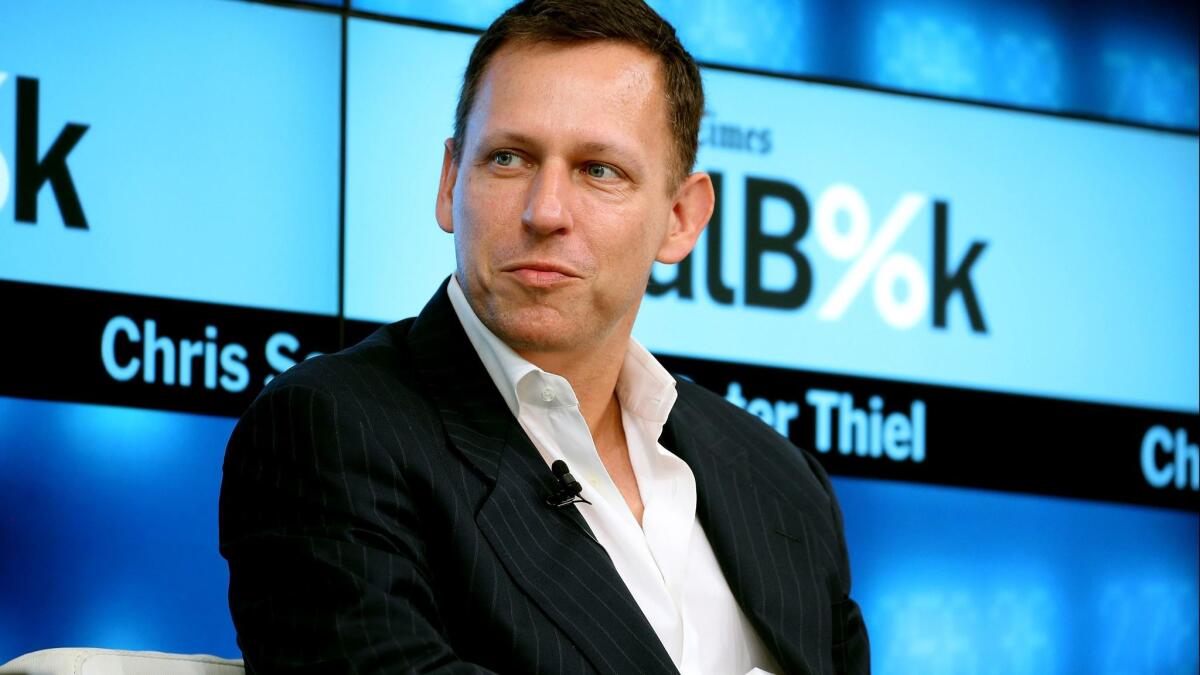Peter Thiel’s resume includes PayPal, Facebook and supporting Trump. And he’s coming to L.A.

Billionaire entrepreneur Peter Thiel has his sights set on Los Angeles, with the prominent tech investor planning to move his residence and some of his business from the San Francisco Bay Area to the Southland.
If Thiel, 50, makes the move, Angelenos will gain a neighbor who has spent most of his career in the heart of Silicon Valley — having co-founded PayPal, invested in Facebook and launched dozens more companies through his investment firms — yet increasingly finds himself at its fringes.
So what’s his story?
Peter Andreas Thiel was born in Frankfurt, Germany, and moved with his family to the United States as a child. Unlike many Silicon Valley entrepreneurs who built their careers as engineers, Thiel studied philosophy at Stanford University before getting a law degree and working at a securities lawyer and derivatives trader.
His first major foray into technology came in 1999 when he co-founded PayPal with Elon Musk, Max Levchin, Luke Nosek and Ken Howery. He served as its chief executive officer until its sale to eBay in 2002 for $1.5 billion, making instant millionaires of the company’s co-founders and early employees. He went on to launch Palantir Technologies, a secretive analytical software company; Founders Fund, a prominent venture capital firm; and the Thiel Fellowship, which every year awards $100,000 to 20 people under the age of 20 to drop out of college and build their own business.
He also made some big bets along the way: He was one of Facebook’s earliest investors (and now sits on its board of directors), and he also provided early funding for companies such as LinkedIn and Yelp.
What’s so controversial about him?
Thiel has long tried to nudge Silicon Valley rightward. As a sophomore at Stanford, he co-founded the Stanford Review, a campus publication associated with conservatism and libertarianism that took pride in going against the grain of liberal student politics.
In 1998, he co-authored a book titled “The Diversity Myth” that addressed the “debilitating impact” he believes politically correct multiculturalism has had on higher education and academic freedom. A year later, he wrote that giving women the right to vote was a blow to capitalist democracy.
Despite its socially liberal bent, Silicon Valley has always had its share of libertarians. But Thiel has increasingly become an outlier. He emerged as an outspoken supporter of President Trump when many industry peers were staunch opponents. He donated $1.25 million to the Trump campaign in 2016, endorsed the president at the Republican National Committee and was an advisor on Trump’s transition team.
In May 2016, he confirmed that he’d financed the lawsuit by Terry Bollea, also known as Hulk Hogan, against Gawker Media for invasion of privacy after the news and gossip site published a sex tape involving Bollea. Gawker outed Thiel as gay in an article published in 2007. Speaking with the New York Times in 2016, Thiel said his funding of the lawsuit was “less about revenge and more about specific deterrence. … I saw Gawker pioneer a unique and incredibly damaging way of getting attention by bullying people even when there was no connection with the public interest.”
The jury awarded Bollea $140 million in damages, which led to Gawker’s shutting down months later. For covertly funding the lawsuit, Thiel faced criticism for restricting freedom of the press.
What are his politics?
Thiel was a member of the Libertarian Party until 2016, when he took the stage at the Republican National Convention to announce, “I am proud to be gay. I am proud to be a Republican.”
He has made campaign contributions to both Libertarian and Republican politicians. In an 2009 essay explaining his reasons for being a libertarian, he wrote: “I stand against confiscatory taxes, totalitarian collectives, and the ideology of the inevitability of the death of every individual. For all these reasons, I still call myself ‘libertarian.’ ”
So what’s with the ‘living forever’ thing?
Thiel would like to beat death. In a 2014 interview with the Telegraph, he said of death: “You can accept it, you can deny it or you can fight it. I think our society is dominated by people who are into denial or acceptance, and I prefer to fight it.”
To wit: He has poured millions of dollars into anti-aging research, expressed interest in parabiosis — a process in which the blood of younger donors is transfused into older recipients for potentially rejuvenating effects — and he told the Telegraph that he has signed up to be cryogenically frozen at his time of death, with the hope of being thawed out and revived by future medical technology.
Twitter: @traceylien







